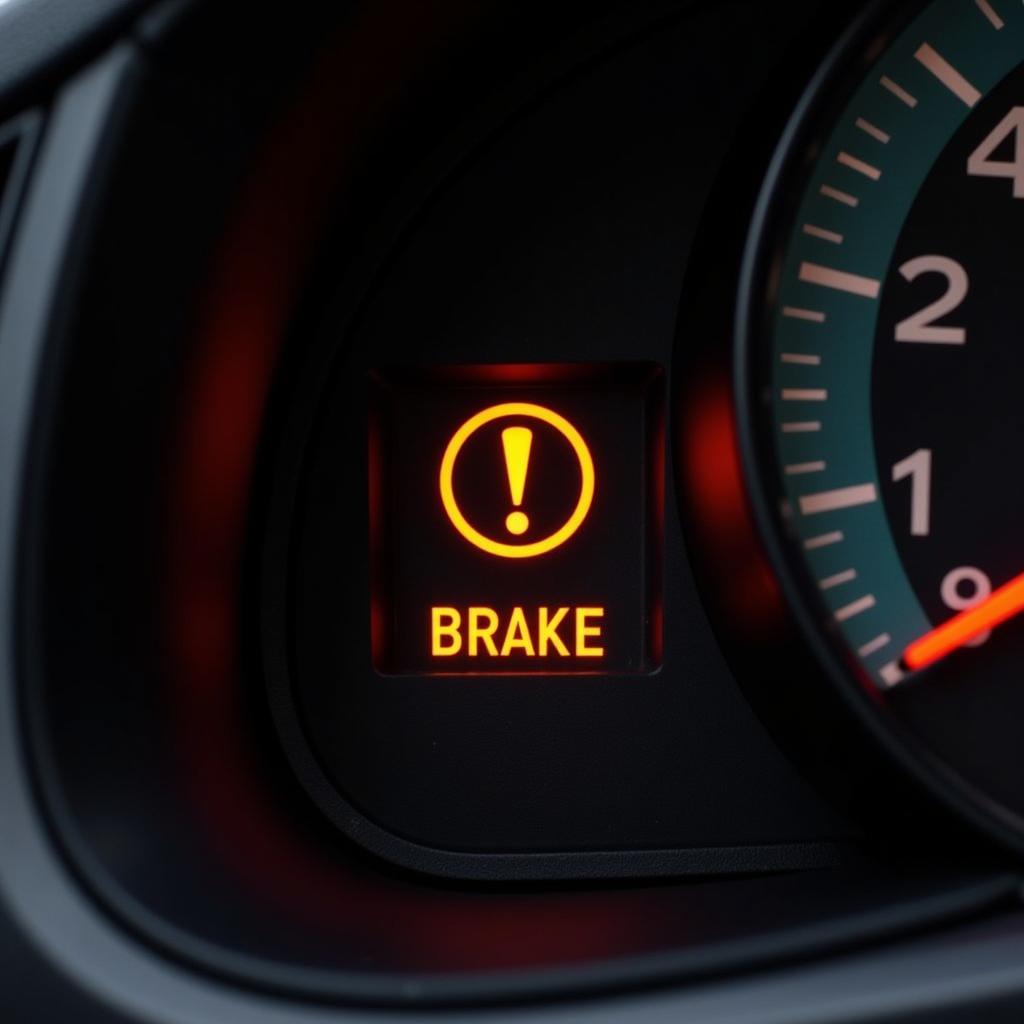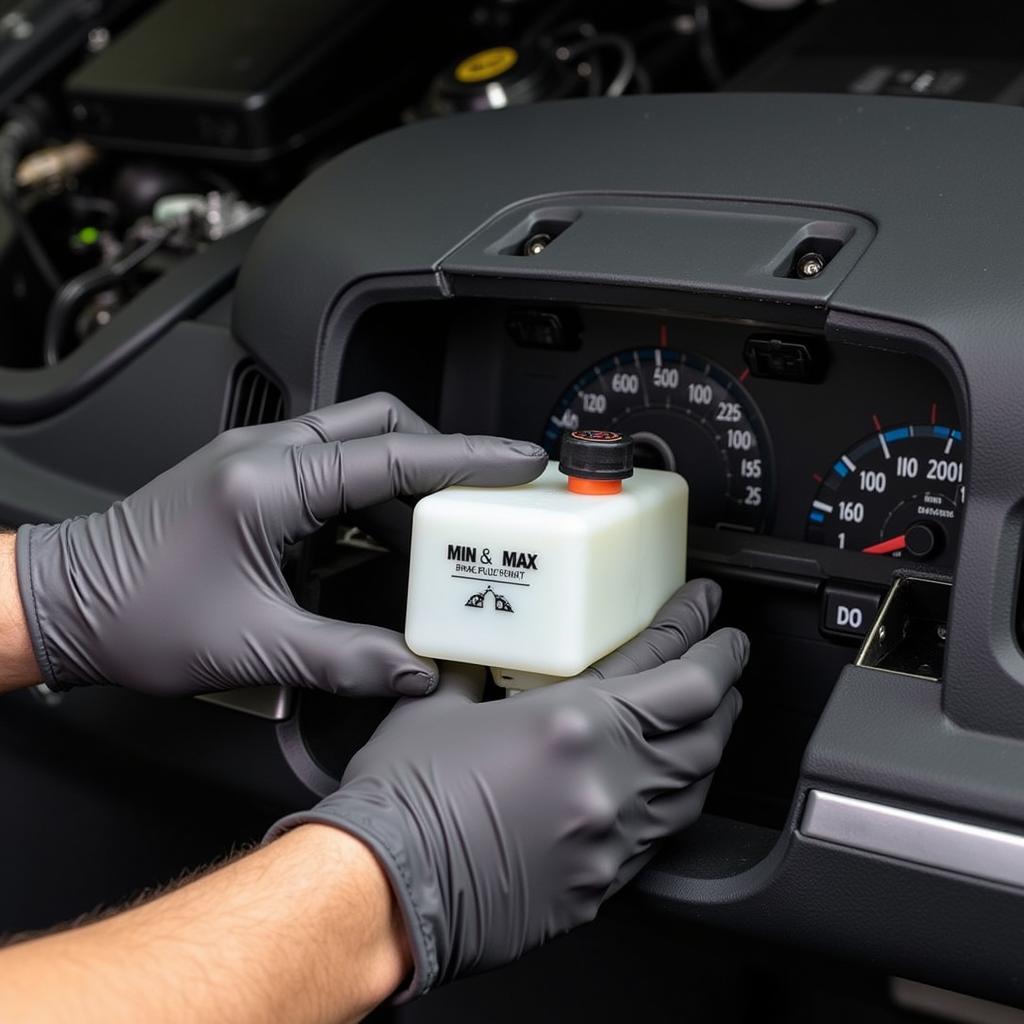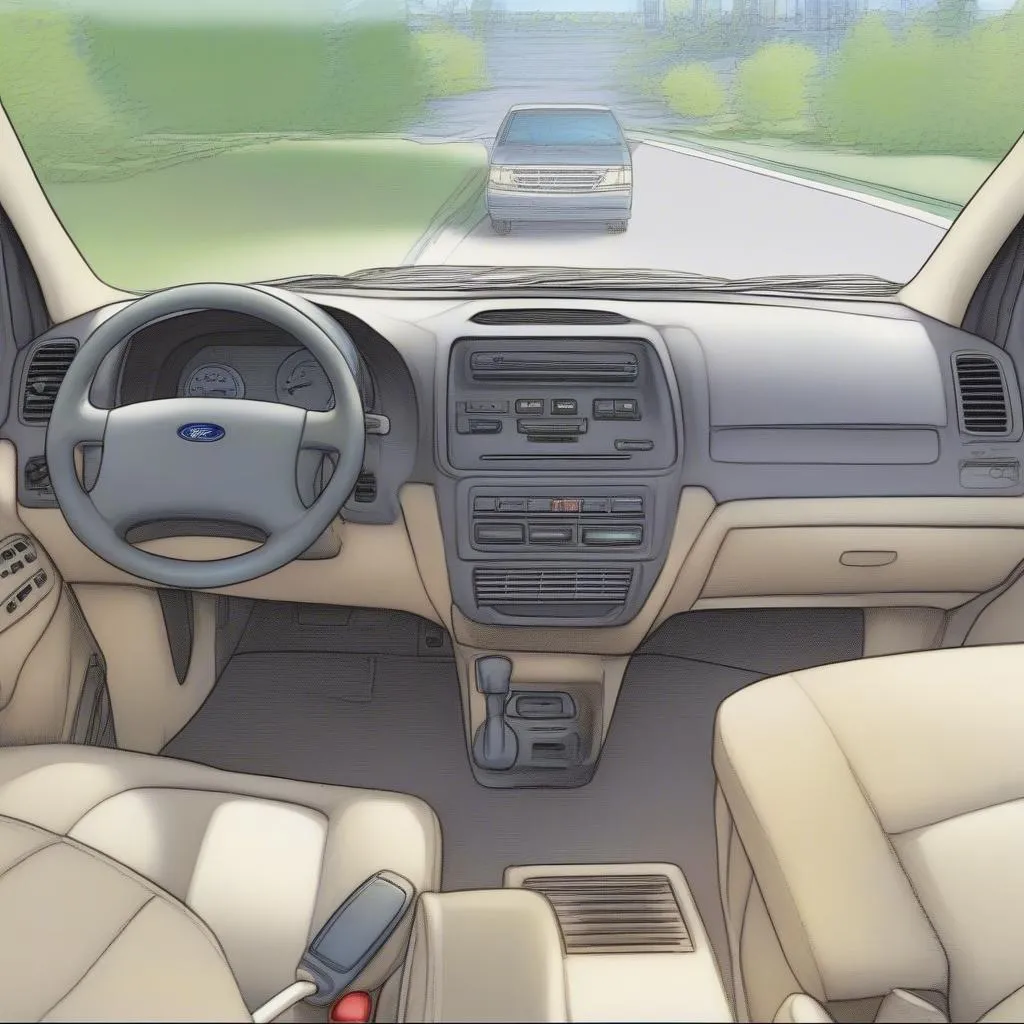The brake fluid warning light on your dashboard is a crucial safety indicator. In Volkswagen vehicles, it usually appears as a circular symbol with an exclamation mark (!) surrounded by parentheses and the letters “BRAKE.” When this light illuminates, it signals a potential problem within your braking system that requires immediate attention.
Understanding the VW Brake Fluid Warning Light
The brake fluid warning light can indicate a few different issues, all of which can compromise your ability to brake safely and effectively:
- Low Brake Fluid Level: The most common reason for this warning light is a low brake fluid level. This can be due to a leak in the braking system or worn-out brake pads.
- Faulty Brake Fluid Sensor: Like any sensor, the brake fluid level sensor can malfunction, triggering a false warning light.
- Worn Brake Pads: As brake pads wear down, the caliper pistons need to extend further to engage the rotors. This displacement can lower the brake fluid level in the reservoir, triggering the warning light.
- Brake System Leak: A leak in your brake lines, hoses, or calipers can cause a dangerous drop in brake fluid pressure and trigger the warning light.
 VW Brake Fluid Warning Light on Dashboard
VW Brake Fluid Warning Light on Dashboard
Is It Safe to Drive with the Brake Fluid Light On?
Driving with the brake fluid warning light illuminated is extremely dangerous. A malfunctioning brake system can lead to reduced braking performance or even complete brake failure, putting you and other drivers at risk.
If your VW’s brake fluid warning light comes on, it’s crucial to pull over to a safe location immediately and contact a qualified mechanic or your nearest Volkswagen dealership.
Troubleshooting a VW Brake Fluid Warning Light
Before assuming the worst-case scenario, there are a few simple checks you can perform yourself:
- Check Your Owner’s Manual: Always start by consulting your VW’s owner’s manual for model-specific information and safety guidelines.
- Inspect the Brake Fluid Level: With the engine off and parked on a level surface, carefully open the brake fluid reservoir (refer to your owner’s manual for its location). The fluid level should be between the “MIN” and “MAX” markings.
- If the fluid is low: Do not drive your car! Call for roadside assistance. Driving with low brake fluid is extremely dangerous.
- If the fluid level is adequate: There may be a fault with the sensor or another component of the braking system. It’s crucial to have a professional diagnose the issue.
 Checking VW Brake Fluid Reservoir
Checking VW Brake Fluid Reservoir
What to Expect at the Mechanic
A qualified mechanic will use a diagnostic scanner to read the error codes stored in your VW’s onboard computer. This will help pinpoint the exact cause of the warning light.
Here are some common solutions for a VW brake fluid warning light:
- Adding Brake Fluid: If the brake fluid level is low, the mechanic will top it off with the correct type of DOT-rated brake fluid specified for your VW model.
- Bleeding the Brake System: Air in the brake lines can compromise braking performance. The mechanic may bleed the system to remove any trapped air bubbles.
- Replacing Brake Pads or Rotors: If worn brake pads are the culprit, they’ll need to be replaced. Depending on the condition of the rotors, they may need resurfacing or replacement as well.
- Repairing or Replacing Brake Components: Leaky brake lines, hoses, or calipers will need to be repaired or replaced.
Preventing Future Brake Fluid Warning Lights
Regular maintenance is key to preventing brake fluid warning lights and ensuring optimal braking performance:
- Adhere to the Recommended Brake Fluid Flush Schedule: Consult your VW’s owner’s manual for the recommended brake fluid flush interval, usually every 2 years or a specific mileage.
- Inspect Your Brakes Regularly: Get in the habit of visually inspecting your brakes for leaks or excessive wear.
- Address Warning Lights Promptly: Never ignore warning lights on your dashboard, especially those related to your braking system.
Conclusion
Don’t take chances with your safety. A VW brake fluid warning light is a serious indication of a potential problem with your braking system. If you see this warning light, pull over immediately and seek professional help. Regular maintenance and prompt attention to warning signs will help ensure your Volkswagen’s braking system remains in top condition, keeping you safe on the road.
FAQs
What type of brake fluid does my VW use?
The correct type of DOT-rated brake fluid for your specific VW model is listed in your owner’s manual. Using the wrong type of brake fluid can damage your braking system.
Can I add brake fluid myself?
While it is possible to top off your brake fluid, it’s generally recommended to have a qualified mechanic handle this to ensure it’s done correctly and to diagnose the underlying cause of the low fluid level.
How long can I drive with the brake fluid light on?
You should never drive with the brake fluid light on. Doing so significantly increases the risk of brake failure. Pull over immediately and seek professional assistance.
How much does it cost to fix a VW brake fluid warning light?
The cost of repair depends on the underlying cause. A simple brake fluid top-up will be relatively inexpensive, while repairing or replacing components like brake lines or calipers will be more costly.
How can I find a qualified VW mechanic near me?
You can use online resources, dealership locators, or ask for recommendations from trusted sources to find a reputable VW mechanic in your area.

